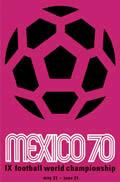FIFA World Cup 1970
 The decision to award the 1970 tournament to Mexico (Argentina also bid) was a controversial one because of the high altitude and intense heat (some matches would have to be played at midday in order to fit in with European television schedules). This was, incidentally, the first World Cup to be broadcast in colour.
The decision to award the 1970 tournament to Mexico (Argentina also bid) was a controversial one because of the high altitude and intense heat (some matches would have to be played at midday in order to fit in with European television schedules). This was, incidentally, the first World Cup to be broadcast in colour.
The African nations were now guaranteed one place in the finals (an issue that had led to a boycott of the 1966 competition) as were members of the Asia/Oceania federations. As Mexico qualified as hosts, a second team from CONCACEF could qualify. Israel appeared for the first time having qualified via the Asia/Oceania section while Morocco represented Africa.
The format was unchanged except that goal difference rather than goal average would now be used to separate teams level on points in the group stage. Up to two substitutes per team were now permitted and referees used yellow and red cards for cautions and expulsions respectively to avoid the confusion seen in 1966.
In the run up to the tournament a brief war broke out between Honduras and El Salvador following a qualifying play-off between the two. Although commonly described as The Football War, the match was merely the trigger that ignited long standing conflicts over frontiers and immigration. England's captain, Bobby Moore was arrested in Bogota for allegedly stealing a bracelet: he was released on bail and the charges were later quietly dropped.
Despite the initial reservations about the venue, the 1970 competition was a great success and marked by a return to free-flowing, attacking football while the eventual champions, Brazil, are considered the finest team to have played in the competition.
Text for this section provided by Steve Monaghan.
1970 Overview | Group 1 | Group 2 | Group 3 | Group 4 | Knock Out Stages
1966 | World Cup Index | 1974